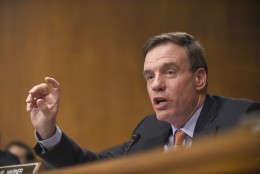Contracts/Awards
-
The continuous diagnostics and mitigation (CDM) program is relying on a blanket purchase agreement approach that isn’t as flexible as DHS and GSA officials thought it would be.
May 16, 2016 -
The Office of Personnel Management terminated its contract with Imperatis on May 9 after the small business alerted the agency it had financial trouble and would be ceasing operations immediately.
May 16, 2016 -
The space agency released its entire source selection document for why it chose SAIC over CACI for a $447.8 million award.
May 16, 2016 -
The Homeland Security Department’s Science and Technology Directorate hosted its first industry day in Silicon Valley and about 200 companies showed up as part of the federal government’s outreach to start-ups.
May 13, 2016 -
The Government Accountability Office wants DoD to declare the update of the F-35 a separate acquisition program for transparency and accountability reasons. Michael Sullivan, GAO's Director for Defense Weapons System Acquisitions detailed that rationale on Federal Drive with Tom Temin.
May 13, 2016 -
The Pentagon is taking a lowest price, technically acceptable approach to the $17 billion, multiple-award contract known as Encore 3. Trey Hodgkins, senior vice president of the IT Industry Council, tells Federal Drive with Tom Temin contractors say that's the wrong approach.
May 12, 2016 -
Objections to the use of lowest-price technically acceptable for contracts are growing, including Booz Allen Hamilton and CACI protests of DISA’s $17.5 billion ENCORE III solicitation and a new bill from two senators to restrict when the military uses this type of contract.
May 09, 2016 -
The Office of Management and Budget is reminding agencies what is expected of them as the countdown begins for the DATA Act's full implementation in May 2017.
May 09, 2016 -
Tucked into the National Defense Authorization bill for 2017 were two provisions that would change contract protests and not in a way favorable industry. The Professional Services Council had asked House Armed Services Committee leaders to drop them. PSC Executive Vice President Alan Chvotkin joins Federal Drive with Tom Temin to discuss what's in the bill.
May 05, 2016 -
Funny thing about small business rules. If you say you're small, you normally have to be small. If you tell federal customers you'll do your own work yourself, you've got to do the work yourself. So why do so many contractors try to get around these basics? Joseph Petrillo, procurement attorney with Petrillo and Powell, joins Federal Drive with Tom Temin to describe a new case that proves the old rule.
May 05, 2016 -
Kareem El-Alaily, managing director of Censeo Consulting Group, highlights the importance of strategic vendor oversight processes for ELA success.
May 05, 2016 -
The American Small Business League filed a lawsuit May 3 calling on the Small Business Administration to stop what its president claims amounts to giving small business contracts to large firms and "inflating" numbers to meet compliance goals.
May 04, 2016 -
The U.S. Postal Service procurement officials say supply chain diversity not only brings small, minority-owned, and women-owned companies into the business of government, but keeps the agency flexible enough to meet new challenges.
May 04, 2016 -
Industry partners are trying to give the next DHA CIO a leg up when the position is filled.
May 03, 2016 -
The Postal Service has several big indefinite delivery-indefinite quantity contracts worth billions, but it doesn't always follow the rules. Lucine Willis, deputy director for supply management and facilities in USPS' Office of Inspector General, fills in the all details on Federal Drive with Tom Temin.
May 03, 2016














